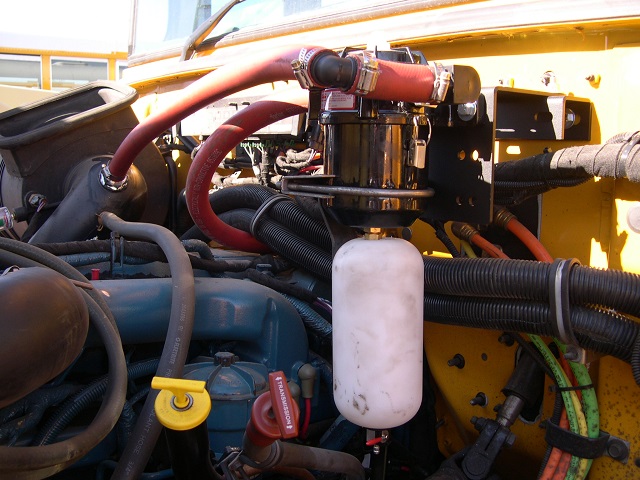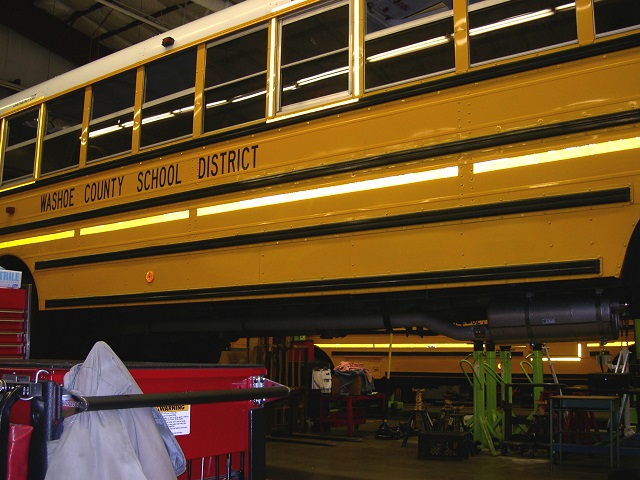Nevada Clean Diesel Program
NOTICE: FY 2023-2024 funds have been allocated. NDEP anticipates FY 2025 funding to be available shortly. These funds are first come first serve so please apply below.
Nevada recognizes the need to reduce emissions from the state’s existing fleet of public and privately owned diesel-powered equipment. This is particularly important where “sensitive” populations such as asthmatics, children, and the elderly are exposed to diesel exhaust emissions. The Nevada Clean Diesel Program works to achieve these fundamental goals:
- Deliver significant reductions in diesel emissions in terms of tons of pollution produced and reductions in diesel emissions exposure from vehicles, engines, and equipment operating in areas designated as poor air quality areas;
- To reduce the exposure of “sensitive” populations to the harmful components of diesel exhaust emissions from diesel-powered vehicles; and,
- To reduce diesel emissions in order to help improve and maintain air quality in communities across Nevada.
The Nevada Clean Diesel Program utilizes, in part, federal grant funds made available through the National Clean Diesel Campaign and authorized by the Diesel Emission Reduction Act to support Program eligible diesel emission reduction solutions. Historically, NDEP has worked with municipal fleets and school districts across the state to replace and retrofit diesel-powered equipment.
For more information regarding the Nevada State Clean Diesel Program, contact ndep.dera [at] ndep.nv.gov.
Types of projects that can be funded:
- Certified Vehicle and Equipment Replacements;
- Certified Engine Replacements;
- Certified Remanufacture Systems;
- Verified Idle Reduction Technologies;
- Verified Retrofit Technologies ;
- Clean Alternative Fuel Conversions (by way of a fuel conversion kit); and
- Verified aerodynamic technologies and low rolling resistance tires.
Types of diesel vehicles, engines, and equipment that can be funded:
- Type A-D School Buses;
- Class 5-8 medium or heavy-duty Transit Buses;
- Class 5 - 8 medium or heavy-duty highway vehicles (vehicles with a gross vehicle weight rating of 16,001 pounds and over);
- Category 1-3 marine engines and vessels;
- Locomotives, to include line-hauls and switch engines;
- nonroad engines, equipment or vehicles used in construction, handling of cargo (including at a port or airport), agriculture, mining, or energy production (including stationary generators and pumps);
- Drayage truck replacement; and
- Transport Refrigeration Units (TRU). Please see this EPA factsheet for more information on TRU eligibility.
Some requirements:
- The existing vehicle, engine, or equipment is fully operational.
- The applicant has owned and operated the vehicle during the two years prior to upgrade.
- The existing vehicle, engine, or equipment has at least three years of remaining life at the time of upgrade.
- The existing engine or vehicle has accumulated the appropriate miles/year during the two years prior to upgrade.
- For Highway vehicles; 7,000 miles/year
- For nonroad engines; 500 hours/year
- For Agriculture pumps; 250 hours/year
- For locomotives and marine engines; 1,000 hours/year
Buy America Requirement:
Infrastructure projects must follow Buy America Sourcing requirements. This requires that all iron, steel, manufactured products, and construction materials must be “produced in the US”. For legal definitions and sourcing requirements, the recipient must consult EPA’s Build America, Buy America website.
For expected scrapping and project close out requirements, please see the Nevada Clean Diesel Program Application under Apply.
Visit the EPA's State Clean Diesel Grant Program webpage to review program materials.
Important Documents for Selected Project Partners
Apply for Funding
Funds are awarded on a first-come, first-serve basis. Please submit the completed forms below to ndep.dera [at] ndep.nv.gov.
In addition to the Clean Diesel Application, please also complete and submit Appendices A through C (these appendices are linked in the application but listed here for reference).
- Appendix A - Eligibility Statement for Highway Engines OR Eligibility Statement for Nonroad Engines OR Eligibility Statement for Locomotives
- Appendix B - Vehicle Information Sheet
- Appendix C - Vendor Quotes/Estimates
Clean Diesel Program Successes
2024
With FY 2024 program funds, NDEP has partnered with Republic Silver State to support the early retirement of 15 program-eligible diesel-powered refuse haulers and replace them with 14 new cleaner CNG refuse haulers and 1 battery-electric refuse hauler.
Reublic has been awarded $650,000.00 for the CNG replacement project and $337,339.35 for the battery-electric replacement project. The early retirement of these vehicles will aid in improving and maintaining air quality.
2023
With FY 2023 program funds, NDEP has partnered with JJSP Leasing to support the early retirement of 1 program-eligible diesel-powered charter bus and replace it with a new cleaner diesel charter bus. NDEP is also securing one other partner to support the replacement of 4 program-eligible diesel-powered tractor trailers and replace them with new battery-electric versions.
JJSP Leasing has been awarded $145,562.00 for this replacement project. The early retirement of these vehicles will aid in improving and maintaining air quality.
2022
With FY 2022 program funds, NDEP has partnered with Washoe County School District to support the retirement of twenty-three program-eligible diesel-powered school buses and replace them with new, cleaner diesel versions.
Washoe County School District has been awarded $1,147,980.89 for this replacement project. The early retirement of these school buses will aid in improving and maintaining air quality.
2021
With FY 2021 program funds, NDEP has partnered with Carson City School District to support the retirement of four program-eligible diesel-powered school buses and replace them with zero emission, battery-electric equivalents.
Carson City School District has been awarded $815,467.20 to complete these replacements. The early retirement of these school buses will aid in improving and maintaining air quality. In addition, exposure to particulate matter and harmful components of diesel emissions will be greatly reduced for school age children.
2020
With FY 2020 program funds, NDEP has partnered with Clark County School District and Washoe County School District to support the retirement of five program-eligible diesel-powered school buses and replace them with zero emission, battery-electric equivalents.
Clark County School District has been awarded $530,776 to replace three program-eligible diesel-powered school buses. The early retirement of these school buses will provide air quality benefits to the Las Vegas Valley. In addition, exposure to particulate matter and harmful components of diesel emissions will be greatly reduced for school age children.
Washoe County School District has been awarded $311,626 to replace two program-eligible diesel-powered school buses. The early retirement of these school buses will aid in improving and maintaining the air quality.
2019
With FY 2019 program funds, NDEP has partnered with the Clark County School District and the City of Reno to support the early retirement and replacement of eleven program-eligible diesel-powered school buses and five program-eligible diesel-powered municipal service vehicles.
Clark County School District has been awarded $425,000 to replace eleven diesel-powered school buses. The early retirement of these school buses will provide air quality benefits to the Las Vegas Valley. In addition, exposure to particulate matter and harmful components of diesel emissions will be greatly reduced for school age children.
The City of Reno has been awarded $271,419 to replace four combination plow/dump trucks and one boom truck. By retiring these service vehicles early both the Truckee Meadows and City of Reno will benefit from emissions reductions. These emissions reductions will aid to improve and maintain air quality. [Back to top]
2018
With FY 2018 program funds, NDEP partnered with and awarded the Clark County School District $659,116 to support the early retirement and replacement of 18 diesel-powered school buses. [Back to top]
2017
With FY 2017 program funds, NDEP has partnered with the City of Reno to support the early retirement and replacement of five diesel-powered service trucks and with Clark County School District to support the early retirement and replacement of five diesel-powered school buses.
The CIty of Reno was awarded $400,000 to replace three diesel-powered flusher trucks, one diesel-powered paint striper truck, and one diesel-powered combination snow plow/dump truck. These vehicles operate within the Truckee Meadows and can often idle for hours while City employees complete work. These replacements will provide the City with quantifiable emissions reductions that will help to improve and maintain air quality.
Clark County School District was awarded $170,000 to replace five diesel-powered school buses. In addition to providing air quality benefits to all of Las Vegas Valley, the early retirement of these school buses will reduce the exposure of school age children to particulate matter and other harmful components of diesel exhaust emissions. [Back to top]
2016
With FY 2016 program funds, NDEP has partnered with the City of Reno to support the early retirement and replacement of three pieces of diesel-powered equipment and Clark County School District to support the early retirement and replacement of two diesel-powered school buses.
The City of Reno was awarded $174,968.86 to replace a sewer/vacuum truck, a combination snow plow/dump truck, and a nonroad tractor. These two vehicles and the nonroad tractor operate within the Truckee Meadows and their early retirement will provide the City with quantifiable emissions reductions that will help improve and maintain air quality. [Back to top]

Clark County School District was awarded $67,606.32 to support the early retirement and replacement of these school buses. In addition to providing air quality benefits to all of Las Vegas Valley, the early retirement of these school buses will reduce the exposure of school age children to particulate matter and other harmful components of diesel exhaust emissions. [Back to top]
2015
The NDEP partnered with the Douglas County School District to support the early retirement and replacement of three diesel-powered school buses. The early retirement of these buses will reduce the exposure of school age children to particulate matter and other harmful components of diesel exhaust emissions.
2013
The NDEP helped fund the early retirement and replacement of an older diesel-powered street sweeper in Carson City. The replacement street sweeper meets 2010 diesel emission standards. In addition to reducing tailpipe emissions through their expected equipment service life, the new street sweeper will the added benefit of reducing dust on county roads that, if left in place, would contribute to particulate matter emissions. [Back to top]
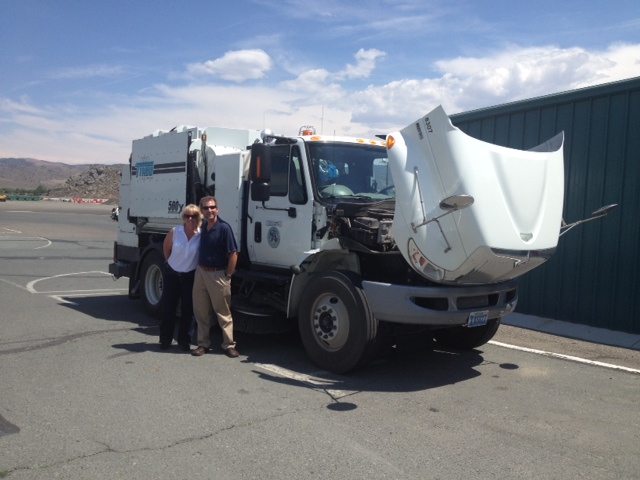
2012
Partnering with the Clark County Department of Public Works, the NDEP helped fund the early retirement and replacement of an older diesel-powered street sweeper that operated in Las Vegas. The replacement street sweeper meets 2010 diesel emission standards. [Back to top]
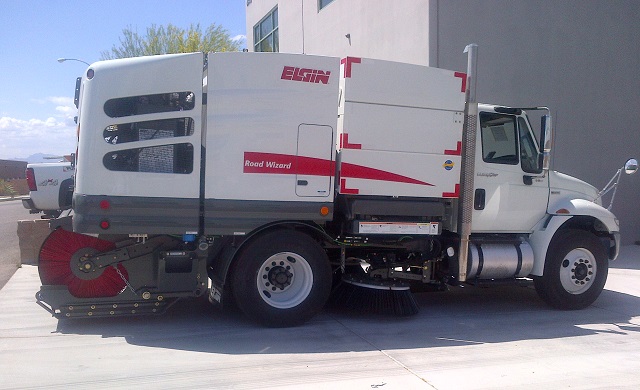
2011
Program funds were focused on reducing emissions by eliminating unnecessary engine idling in school buses. Diesel engines are commonly left to idle during cold weather startup; this is done to warm the engine and cabin prior to the first school bus route of the day. Unfortunately, this also results in diesel emissions in the ambient air as well as a buildup of diesel emissions in the cabin. An idle-reduction technology known as a fuel-operated engine heater was selected to reduce emissions. These timer-activated heaters burn a small quantity of fuel to warm the engine prior to each day’s use, eliminating the need for startup idling. In addition to emission benefits, these heaters save the school districts diesel fuel and result in less wear-and-tear on the engines. Approximately 400 fuel-operated heaters in eight Nevada school districts were installed. [Back to top]
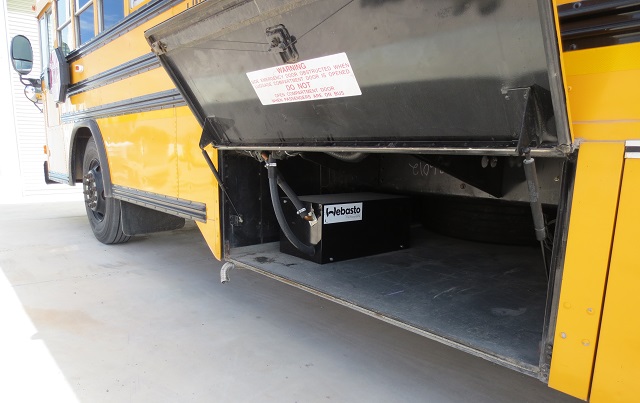
2010
The very oldest diesel-powered school buses in daily operation were targeted for replacement with new, lower emission models. Seventeen new school buses meeting 2010 diesel emission standards were delivered to school districts across the state and those old, high mileage buses were permanently retired. [Back to top]
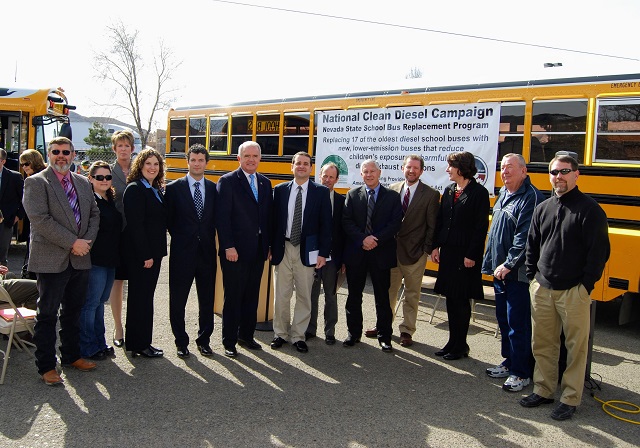
2008-2009
In the Program’s first two years, permanent emissions reductions were achieved in more than 250 school buses in nine school districts across the state. School buses with vehicle model years 1991 through 2004 were retrofitted with emission reduction components. These buses had Diesel Oxidation Catalyst and Closed Crankcase Ventilation Systems installed. These components were selected from the EPA Verified Technology list of proven aftermarket emission reduction components. [Back to top]
